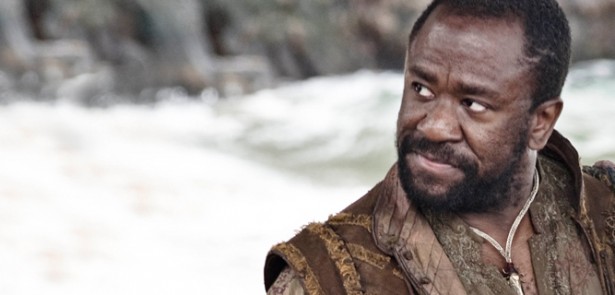From the archives: Lucian Msamati interview

Lucian Msamati is probably best-known to audiences as salty sea pirate Salladhor Saan from the global smash-hit TV show Game Of Thrones. But he’s also an extremely talented and experienced Shakespearean actor, set to star in Iqbal Khan and the Royal Shakespeare Company’s new production of Othello, which opens at Stratford-upon-Avon next month and will live-stream to cinema audiences around the world on 26 August. And the twist? Lucian isn’t playing Othello, he’s playing the General’s nemesis, Iago, the first time ever in the UK that the role has been performed by a black actor. The Moment magazine caught up with Lucian during a break in rehearsals to find out about exploring villainy, confounding expectations – and playing the best pirate on telly!
I’ve caught you fresh from rehearsals – how’s it all going, and what’s the buzz like in the rehearsal room?
It’s good! It’s the beginning of the week after a long, refreshing weekend, we have returned full of vim and vigour, ready to attack!
How’s the rest of the cast enjoying the innovative casting of you as Iago?
It’s fantastic, I think. Everyone has bought into it, there certainly haven’t been any issues, doubts or awkward questions, other than in pursuit of the work. It’s all been very good, very positive – and exciting. I think that everyone is embracing the excitement of the challenge.
Modern interpretations of Othello utilise racism, making it a major plank of Iago’s character, but presumably that plank is now no longer there…
Not necessarily!
Well, that’s interesting! I was going to ask: does that present you, as an actor, with perhaps a bit of a daunting void to fill – but it sounds as though you don’t see it as a void at all!
It’s become standard to say that Iago is a racist or uses race, but he is not the first character in the play to make a direct racist accusation or insult. It’s strategic: during the action you see the cogs turning and he’s thinking, ‘I know how to use this’. It’s never been an issue for me, because I grew up in a place where I was in the majority [Lucian spent his youth in Zimbabwe], and everyone looked like me. Prejudice, in that instance, is prejudice – people will find a reason for it if they want to, because if it’s not race it’s, ‘Oh, you’re a Manchester United fan’, or ‘You’re a Liverpool fan’, you’re from this neighbourhood or that neighbourhood – all those things come into it. So, racism is used unfairly, I think, in this play, and in quite a limiting way as a definition of a dynamic between two characters. We are kicking that out and thinking, hang on: let’s look at this with a bit more of an acute and truthful eye – because I will be honest with you, I know people who are as black as I am who have said the nastiest things about someone else who is also as black as I am. And other people I know, Scottish, Irish, Swedish, Japanese! All have at times said things… well, you don’t have to look very far to find the lines that people use to divide, on whatever level.
Actually, what I have found very satisfying with Iago is that there is SO much more going on between him and Othello than the colour of their skin – these are men who have fought wars together. They have been, and excuse my language, but they have been through the s*** together, and beyond. There is a deep, deep union, a deep bond that goes beyond absolutely anything else. What on Othello’s part might be seen as a strategic move promoting Cassio over Iago, for Iago it’s like: ‘Hang on, we have spilled blood and worse together, we have slaughtered people together. I know things about you and you know things about me, and this is what you do to me?’ I think that’s far richer, far more interesting, than to simply say: ‘Oh, it’s because X, Y and Z’. Of course that comes into it, it gets used strategically and maliciously, but it is not just that.
It sounds as though you are really enjoying ‘unpacking’ Iago!
Of course! I have dived into it with passion, enthusiasm and rigour, as with any other role! It would be incredibly dull and a real waste of everybody’s time if I already had a template of how my Iago is going to operate. You look to see what surprises are offered by your colleagues, and you look to see where this character is coming from – you can’t just think that he’s simply a snivelling master criminal who haunts the shadows like a devil.
At what point in the process did you come on board, and what were your thoughts when you first heard about the idea to cast an actor of colour as Iago?
Well, funnily enough there had been a discussion with a very well-known and well-respected theatre company to gauge my interest in playing Othello, and I had said – and no slight against them at all, at all, at all! – that firstly, Othello is not my favourite Shakespeare play; and secondly, the only role I would find interesting in that piece is Iago, so unless they were offering Iago it would be a polite but firm ‘no’. Then our director – the mighty Iqbal Khan! – called me up literally out of the blue and said, ‘Listen, I’m kicking around a few ideas to do with Othello’. He wanted to look, over a week’s worth of workshops, at what it would be like having a black Iago and also a white Iago. We knew instinctively that having a black Iago would work! But, of course, it was valuable and important to get up and to see, through the workshops. And after that week I simply waited: the decision needed the ‘ultimate sanction’ from Greg [Gregory Doran, the RSC’s Artistic Director], but when it came down to it, the decision was Iqbal’s. So thanks Iqy, in advance!
The Moment caught up with the actor and comedian Ben Bailey Smith (Doc Brown) not long ago, and we chatted about the lack of opportunities for actors of colour. Do you see this production as a potential game-changer with regard to that?
My positive desire, my burning wish, is that this will blow things out of the water, one way or another, artistically and otherwise. I think all of us wish that. It is always disappointing when we, players and warriors of the imagination, are limited by cosmetic differences. I find it incredibly… annoying! It’s ignorant, and cowardly and dull. It was said when people complained about Idris Elba’s role in Thor: ‘It’s perfectly fine to have a flying, magic space hammer – but you can’t have a demi-god who isn’t white!’ In some ways I do think it is a very dull conversation to have, because I think: are we seriously in the 21st century, still having these discussions! But the reason we are having them is obvious to see. Sometimes it takes the bravery and instinct of certain directors, creators and producers to say: ‘No, let’s go this way’, and trust that it is being done with passion and integrity, not with gimmicks. The RSC doesn’t need to do gimmicks, and neither do Hugh Quarshie or Iqbal Khan! So, yes, let’s hope it opens a few doors, here and there.
This production will be live-streamed. How does that feel, to know the piece will go beyond the theatre walls – will go global, in fact?
Incredibly exciting! I’ve had the privilege of doing a live-stream performance before, and it’s a fantastic atmosphere and mood – it’s amazing to think that people in far-flung corners of the world are getting the chance to see different things. You think: ‘Well, the seeds have been planted now, we just have to keep enjoying ourselves and doing our jobs!’
Now, we’ve talked a lot about Shakespeare, of course. But I know many of my readers would be very disappointed if I didn’t ask you about Game of Thrones! What’s it like to be involved in something that can only be described as an entertainment phenomenon?
The bizarre thing is that it doesn’t feel like that when you’re on the inside! It’s fantastic work, and I’m doing it with fantastic people, and I play a fantastic character! And I’m so lucky that the producers trusted me to just run with it and do my own thing, it’s a great privilege and honour. You do notice little things of course, you go back year in and year out, and there’s a little bit more of this and of that, but when it comes down to it, it’s a bunch of performers who simply work at getting on with it – and long may that continue!
Othello will be broadcast live to cinemas on 26 August 2015. Check www.vivacity-peterborough.com/venues/key-theatre to find out more.















